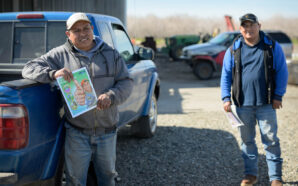Doug Moss & Roddy Scheer / EarthTalk
What is being done to save elephants around the world? I understand that these magnificent creatures are teetering on the brink of extinction. – Millie Vicente, San Jose, CA
In just one decade between 1979 and 1989, half of all Africa’s elephants were lost to the ivory trade. Public outrage over the loss led to a ban on all international trade in elephant tusks by the Convention on International Trade in Endangered Species (CITES)—an international agreement regulating trade in wild animals and plants—and African elephant populations were able to bounce back.
However, a disturbing new wave of illegal elephant poaching has been underway in Africa in recent years, due to rising demand for ivory goods by China’s budding middle class. As much as 70 percent of illegal ivory goes to China. In Beijing, one pound of ivory can bring in $1,000. From 2010 to 2012 alone, 100,000 elephants were killed for ivory tusks. Last year, approximately 30,000 elephants were illegally poached—this equates to one elephant being killed every 15 minutes.
Massacres that leave behind graveyards of nearly 100 elephant remains have become prevalent across Africa. In 2013, poachers on horseback in southwest Chad shot and cut the tusks off of at least 86 elephants, including 33 pregnant females, in less than a week. American missionary Gary Roberts tried to rescue a surviving baby he found tied to a tree, but despite his best efforts the elephant died. “The poachers killed pregnant females and all the calves,” said Celine Sissler-Bienvenu from the International Fund for Animal Welfare (IFAW). “Even if the conditions were right, which they are not, it would take more than 20 years for this population to recover.”
In Zimbabwe, poachers are using cyanide to kill entire herds at a time. In October 2015, rangers in Zimbabwe’s Hwange National Park found 78 elephants killed by the poison. “We’re now trying to check how many elephants had fully developed tusks, because babies are among those killed,” said Zimbabwe Parks and Wildlife Management spokeswoman Caroline Washaya-Moyo. “The rate at which we are losing animals to cyanide is alarming,” she added. Some 300 elephants fell victim to the same fate in the park a year before. Many non-target species are also dying from the cyanide intended for elephants. The park agency was hoping drones and trained dogs would intensify poacher monitoring.
According to a June 2014 CITES report, 20 percent of Africa’s elephants may be killed in the next 10 years if poaching continues at current levels. Meanwhile, many worry that extinction isn’t far off. “This species could be extinct in our lifetime, within one or two decades, if the current trend continues,” said Dune Ives, senior researcher at Vulcan Inc., which is working with the non-profit Elephants Without Borders on the Great Elephant Census to document elephant population numbers around the world. “In five years, we may have lost the opportunity to save this magnificent and iconic animal.”
Meanwhile, other groups are working diligently to spread awareness about the ongoing crisis. In summer 2015, Save the Elephants staged public demonstrations in Beijing and New York City where they destroyed nearly two tons of ivory. “If we want our grandchildren to grow up in a world where they see elephants in the wild,” U.S. Interior Secretary Sally Jewell told the crowd amassed at the New York event in Times Square, “we owe it to them to shut down the market that fuels poachers.”
CONTACTS: CITES, www.cites.org; IFAW, www.ifaw.org; Great Elephant Census,www.greatelephantcensus.com; Elephants Without Borders,www.elephantswithoutborders.org; Save the Elephants, savetheelephants.org.
EarthTalk® is produced by Doug Moss & Roddy Scheer and is a registered trademark of Earth Action Network Inc. View past columns at: www.earthtalk.org. Or e-mail us your question: earthtalk@emagazine.com.






